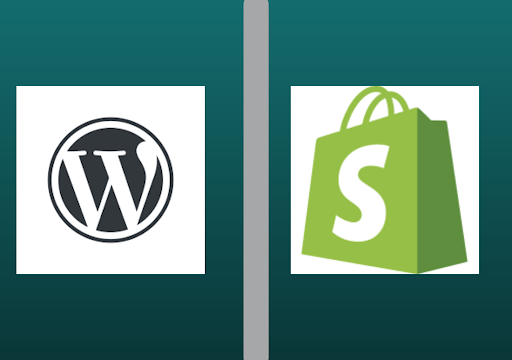
December 16, 2022
In the world of e-commerce, choosing the right platform for your business can be a daunting task. There are many options out there, each with its own plethora of offerings. Two of the most popular platforms for businesses are WordPress and Shopify.
WordPress is a content management system (CMS) that is widely used by businesses and individuals alike. It’s known for its flexibility and ease of use, making it an attractive option for those looking to create a website without the need for technical expertise.
It also has a large community of developers and support, which means that there are plenty of resources available to help you get started.
Shopify, on the other hand, is a dedicated e-commerce platform. It’s designed specifically for businesses looking to sell products online, and offers a range of tools and features to help you manage your online store.
It’s known for its simplicity and user-friendly interface, which makes it a great option for those just starting out with e-commerce.
Both WordPress and Shopify have their own unique strengths and weaknesses. In the end, the choice between the two will depend on your specific business needs and goals.
In this blog, we will compare the two platforms and discuss the pros and cons of each platform to help you determine which one is the best fit for your business.
Both platforms have their own unique set of features, advantages, and disadvantages, and the best option for your business will depend on your specific needs and goals.
One of the key differences between WordPress and Shopify is the level of control and flexibility they offer.
WordPress is an open-source platform, which means that users have complete control over their website’s design and functionality.
This makes it an excellent choice for businesses that need a high degree of customization, such as those with complex product offerings or unique branding requirements.
Shopify, on the other hand, is a hosted platform that offers a more intuitive and user-friendly interface. It is ideal for businesses that want to set up an online store quickly and easily without having to worry about the technical aspects of website design and development.
Another important consideration is the type of industry you are in. If you are running a small retail business, for example,
Shopify may be the better choice due to its robust e-commerce features and integration with various payment gateways. On the other hand, if you are in a more specialized industry and need a highly customizable website, WordPress may be the better option.
Below are some of the pros and cons of each platform to help you make an informed decision:
WordPress Advantages
1. Flexibility and customization
WordPress allows you to create any type of website, from a simple blog to a complex e-commerce store. It also has a large library of themes and plugins that allow you to easily customize the look and functionality of your site.2. Ease of use
WordPress is known for its user-friendly interface, which makes it easy for even those with no technical expertise to create and manage a website.3. Large community of support
WordPress has a large community of developers and users, which means that there are plenty of resources available to help you get started and troubleshoot any issues that may arise.4. Other
- Large selection of free and premium themes and plugins to extend the functionality of your website
- Strong community support and regular updates to keep your website secure and up-to-date
- Excellent for blogs, portfolios, and other types of content-heavy websites
WordPress Disadvantages
1. Security
WordPress is a popular platform, which means that it’s a common target for hackers. While there are measures you can take to improve the security of your site, you’ll need to be vigilant in order to keep it safe.2. Maintenance
As a self-hosted platform, WordPress requires regular maintenance in order to keep it running smoothly. This can include tasks like updating plugins, backing up your site, and optimizing your database.3. Limited e-commerce capabilities
While WordPress does have some e-commerce capabilities, it’s not a dedicated e-commerce platform like Shopify. This means that if you’re looking to sell products online, you may need to use additional plugins or integrations to achieve the functionality you need.4. Other
Requires more technical expertise to set up and maintainShopify Advantages
1. Dedicated e-commerce platform
Shopify is a dedicated e-commerce platform, which means that it’s designed specifically for businesses looking to sell products online. It offers a range of tools and features to help you manage your online store, including inventory management, payment processing, and shipping integrations.2. User-friendly interface
Shopify is known for its user-friendly interface, which makes it easy for even those with no technical expertise to create and manage an online store.3. Large library of themes and apps
Shopify has a large library of themes and apps that allow you to easily customize the look and functionality of your site.4. Other
- Robust e-commerce features and integrations with popular payment gateways
- 24/7 support and regular updates to keep your website secure and running smoothly
- Excellent for businesses that want to quickly and easily set up an online store
Shopify Disadvantages
1. Limited flexibility
Because Shopify is a dedicated e-commerce platform, it may not offer the same level of flexibility as a general-purpose CMS like WordPress. This means that if you want to create a website that isn’t focused on e-commerce, you may need to look at other options.2. Monthly fees
Shopify operates on a subscription-based model, which means that you’ll need to pay a monthly fee in order to use the platform. This can add up over time, especially if you’re just starting out with your business.3. Limited customization
While Shopify does offer a range of themes and apps to customize your site, the options may be more limited than those available with a platform like WordPress. This means that if you have very specific design or functional requirements for your site, Shopify may not be the best option.Conclusion
In conclusion, choosing between WordPress and Shopify is like deciding between a multi-tool and a dedicated screwdriver – both have their uses, but one may be a better fit for your specific project.If you’re a jack-of-all-trades type of business looking for flexibility and customization, WordPress may be the way to go. But if you’re a one-trick pony focused on selling products online, Shopify is the screwdriver you need to get the job done. No matter which platform you choose, just remember that a website is only as good as the content on it – so make sure to put in the effort to create something truly exceptional.
Or
In conclusion, both WordPress and Shopify are popular and powerful options for businesses looking to create a website or online store. The right platform for your business will depend on your specific needs and goals.
If you’re looking for a flexible and customizable solution that can be used for a wide range of purposes, WordPress may be the best choice.
However, if you’re looking to create an online store and want a dedicated e-commerce platform with built-in tools and features, Shopify may be the better option.
Before making a decision, it’s important to carefully consider your business needs and goals, as well as the pros and cons of each platform.




No Comments